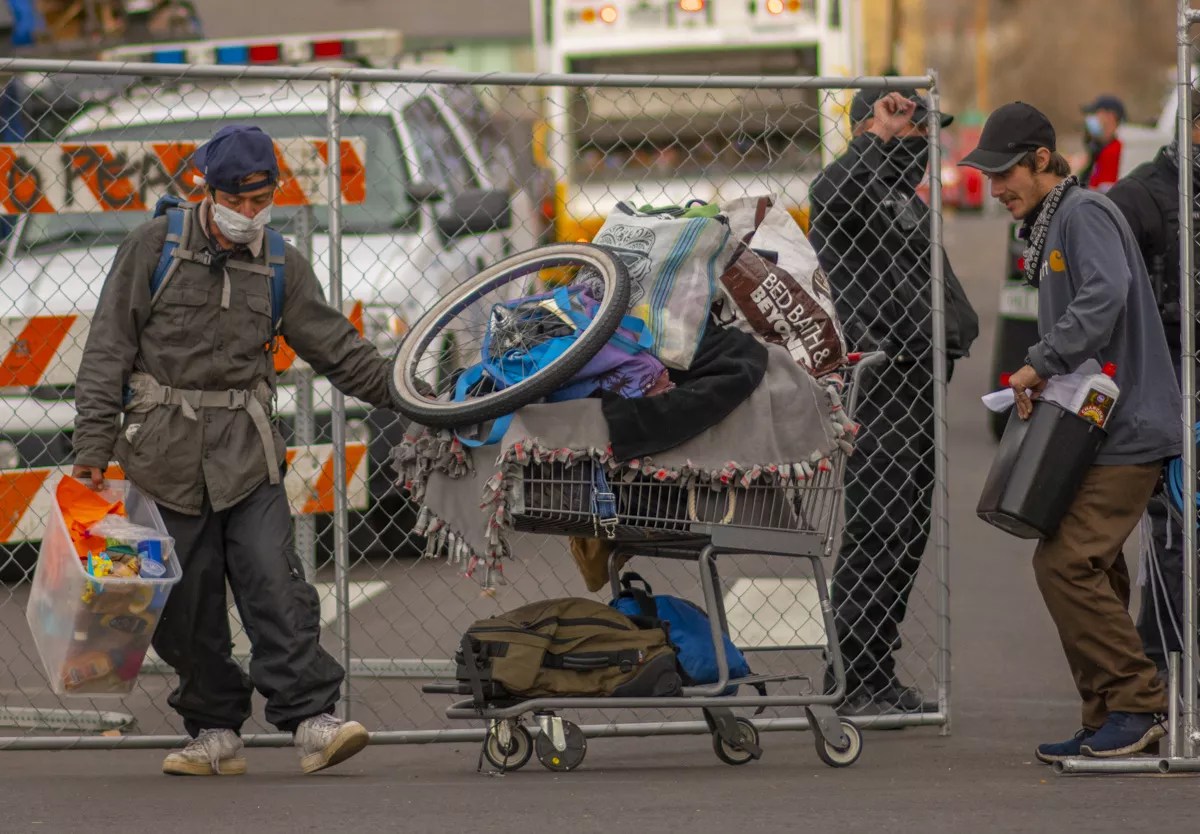
Evan Sem

Audio By Carbonatix
A three-judge panel from the 10th Circuit Court of Appeals has ruled in favor of a federal court order requiring the City of Denver to provide at least 48 hours’ notice before conducting homeless encampment sweeps, even when there are public health or safety concerns.
The March 1 ruling comes a month after Judge William J. Martinez of the U.S. District Court of Colorado issued his decision on a motion for a preliminary injunction in the class-action suit filed last October by ten homeless individuals and Denver Homeless Out Loud regarding homeless sweeps during the pandemic. While Martinez did not grant the injunction and prohibit sweeps entirely, he did determine that advance notice of sweeps was required. The Denver City Attorney’s Office promptly filed an emergency motion to block the order with the 10th Circuit Court of Appeals, which the panel refused to do; the City of Denver has also appealed the ruling on a non-emergency basis, which means that attorneys representing the city will still have a chance to fully litigate an appeal in the coming months.
“Instead of just taking the simple precautions outlined in the preliminary injunction, Denver continues to fight tooth and nail even after judge after judge after judge tells them that their actions are unconstitutional,” says Andy McNulty, the Killmer, Lane & Newman attorney who filed the plaintiffs’ suit against the City of Denver, the State of Colorado and a private waste management contractor last fall.
“The City will move forward with an appeal,” responds Theresa Marchetta, spokesperson for Mayor Michael Hancock’s office. “We have an obligation to all of our residents to act swiftly in the case of a public health or safety emergency or significant environmental impacts, which we unfortunately see with some frequency in large encampments. Our goal is always to connect our unhoused neighbors with shelter, housing, services, treatment and care, as we fulfill our chartered responsibility to protect the public, including people who live in encampments, from the hazards that these encampments pose.”
In making his case for the preliminary injunction, McNulty argued that the defendants had been ignoring guidelines the Centers for Disease Control and Prevention guidelines advising municipalities not to sweep encampments unless individual housing is available, so as not to further spread COVID-19.
While Martinez was not persuaded by that argument to completely prohibit sweeps, he did find merit in McNulty’s claims that the City of Denver had been engaging in unconstitutional conduct related to property rights by not giving enough meaningful notice before encampment sweeps.
In his January 25 ruling on the motion for preliminary injunction, Martinez stated that Denver officials must now provide at least 48 hours’ written notice before sweeping an encampment, even when exigent circumstances related to public health or safety exist. Additionally, the City of Denver must provide at least a week’s notice before conducting other sweeps in non-exigent contexts, Martinez ruled, noting that Denver should already have been doing so per an earlier federal court settlement.
“The Court will issue the narrowest injunction possible so that Plaintiffs’ procedural due process rights are protected, and the Denver Defendants are not unduly restrained in their ability to maintain the public health and safety,” Martinez wrote. (He did not include the State of Colorado or the private contractor in his preliminary injunction ruling.)
A day after the ruling was released, Denver filed its emergency motion to stay the preliminary injunction. In it, Geoffrey Klingsporn, a senior assistant city attorney for Denver, stated: “If Denver is prohibited from making decisions related to encampments when significant public health, environmental, and/or safety risks are found – especially during the COVID-19 pandemic – all Denver’s residents, including people experiencing homelessness, could be placed at grave risk of significant and irreparable harm.”
In explaining their rejection of the emergency motion to stay Martinez’s ruling, 10th Circuit Court of Appeals judges Jerome A. Holmes and Gregory A. Phillips simply said that the City of Denver had not met its burden to secure a reversal of the ruling. Judge Carlos Lucero, who dissented from the decision, said that “the preliminary injunction hamstrings [the City of Denver] from promptly responding to potentially serious public health crises.”